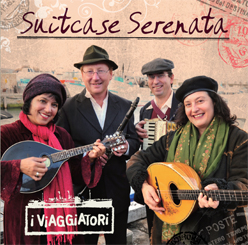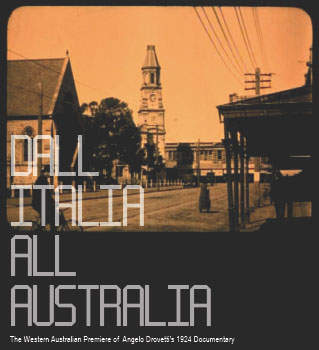
Dall’Italia All’Australia premieres
as precious memories are fondly rekindled
On Sunday, May 29, 2005 the film Dall’Italia All’ Australia premiered in this country, almost 80 years to the day since its Italian release.
More than 1500 people filed into the Melbourne Town Hall for the historic screening, to the accompaniment of the selected works of Mascagni, Rossini and Verdi as performed by master organist Thomas Heywood on the world famous grand concert organ.
Amongst those in the audience were music aficionados, film historians and members of the Italian community, including GABRIELLA COSLOVICH, a correspondent for The Age newspaper who migrated to Australia from Italy 38 years ago.
On June 2, four days after the premiere, Gabriella’s story, as follows, appeared under the headline Benedetta l’Australia, which declared that the real spirit of Italian National Day was with the ocean-going migrants of the 1920s.
It’s funny how Australians celebrate Italian National Day with more relish than Italians do in Italy. In the old country, Italian National Day, which falls today, is mired in politics. The day commemorates the dumping of the monarchy following a referendum in 1946. But Italians, whose sympathies have always been more regional than national, don’t fuss about the anniversary of the republic’s founding.
In Australia, the day is a merry excuse to celebrate the contribution of Italian migrants, and if that can sometimes seem a little superficial, with an emphasis on free pizza and pasta, I’m willing to swallow that.
No one pays much notice to the day’s political connotations, not even a staunch monarchist such as our own Prime Minister, John Howard, who, on Sunday, paid tribute to Italian migrants for their massive contribution to modern Australia in his speech celebrating Italian National Day at Wharf 8 in Sydney.
In Melbourne, we made do with Lord Mayor John So, who launched Italian Republic Day at Federation Square, where the usual bunch of tired old entertainers were passed off as Italian favourites and the public invited to partake in coffee-drinking and chestnut-eating.
Whatever. The really important stuff was going on elsewhere, beyond the official program, as confirmed by the queues from the Melbourne Town Hall all the way up Collins Street. People were patiently lining up to see an 81 year-old silent film about an extraordinary voyage, a film never before shown in Australia.
Shot in 1924, by Italian director Angelo Drovetti, the film Dall’Italia All’Australia documented the seven-week journey from Genoa to Australia made by Italian, Yugoslav, Greek, Arab and Jewish migrant passengers on the steamship Regina d’Italia. Giacomo Silvagni – the father and grandfather of Carlton footballers Sergio and Stephen – was among them.
With recent Immigration Department bungles, and the revolt on the Liberal backbenches regarding the issue of mandatory detention, it would have been easy to make a political statement of the screening. But its organiser, Melbourne journalist and author, Tony De Bolfo, refrained from doing so.
Even so, the event took on a symbolism of its own. The 1500 or so people who turned up stood to sing the national anthem before the screening, to the accompaniment of exuberant maestro Thomas Heywood on the Town Hall’s grand pipe organ.
We had the words, so we could sing, and for someone with a deep-seated suspicion of any sort of nationalistic fervour, it was surprisingly moving. "For those who’ve come across the seas we’ve boundless plains to share".
Then we watched as the Regina d’Italia set off on its journey, along the Italian peninsular, on to Port Said and into the Suez Canal, which the effusive yet somehow entirely appropriate Italian intertitles likened to a deep, enormous wound inflicted by the hands of a god.
I had made the same journey through the Suez Canal in 1967, as a three year-old, with my parents. As I watched the Regina pass that unbelievably long canal, past camels and white desert sands, all I could think of was the wound in my parents’ hearts as they left their country for another. I wasn’t the only person whose face grew shiny at the sight of the Suez, the Red Sea and the vast Indian Ocean beyond.
"Che rischio per sta gente far sto lungo viaggio," a woman near me said, marveling at the risk these people took in the 1920s.
"They were the first to come, they gave courage to other people," her friend responded.
There was joy too, as the ship reached Australian shores and we saw footage of our cities as they were in 1924 – Sydney sans Opera House or Harbour Bridge, and a bustling Melbourne, then the seat of the Australian Government. Drovetti marvelled at the city’s trams with underground cables and its "Stazione Centrale" with clocks on the entrance, which he praised as a practical and helpful idea.
One of the oldest people at the Town Hall on Sunday was Maria Cera, whose brother, Guerino, was on the Regina d’Italia. Maria, who turns 95 in July, followed him two years later. I rang her later to ask what she thought of the film.
"Beautiful, beautiful, beautiful. Proprio speciale."
What was it like in Australia in 1926? Was it hard? "Oh yes! We had to speak very quietly in Italian. You know how Italians are – we love to shout, but the Australians didn’t like that."
As we finished our chat, Maria Cera profusely blessed the country that had accepted her.
"Benedetta l’Australia!"
May the children of Villawood one day say the same.
Join the Mailing List
News
CLICK HERE FOR COMING PERFORMANCES
NEW CD - SUITCASE SERENATA
available now
17 Tracks

